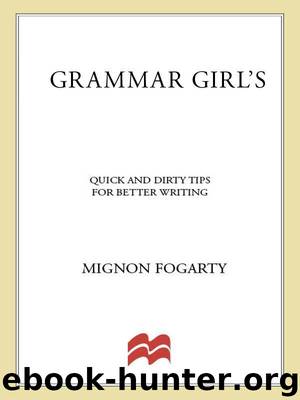Grammar Girl's Quick and Dirty Tips for Better Writing (Quick & Dirty Tips) by Fogarty Mignon

Author:Fogarty, Mignon [Fogarty, Mignon]
Language: eng
Format: epub, mobi
ISBN: 9780805088311
Publisher: Henry Holt and Co.
Published: 2008-07-08T00:00:00+00:00
ELLIPSES: MY THOUGHTS ARE TRAILING OFF . . .
The Omission Ellipsis
The most common and formal use of ellipses is to indicate an omission. If you’re quoting someone and you want to shorten the quote, you use ellipses to show where you’ve dropped words or sentences.
Here’s a quote from the book Our Mutual Friend by Charles Dickens: “I cannot help it; reason has nothing to do with it; I love her against reason.”
Now far be it from me to edit Dickens, but if I were a journalist under a tight word limit looking at that quote, I’d be tempted to shorten it to this: “I cannot help it . . . I love her against reason.” That middle part—reason has nothing to do with it—seems redundant, and taking it out doesn’t change the meaning. Dot-dot-dot and it’s gone, which saves me seven words. Clearly, literature and journalism are not the same thing.
Integrity is essential when using ellipses in this way. It’s fine to use an ellipsis to tighten up a long quote by omitting unnecessary words, but it’s important that you don’t change the meaning. It’s wrong to omit words to misrepresent what someone has said. For example, imagine what an unethical writer could do with the following quote:
“Gigli was the best movie of 2003—if you were a vapid tabloid groupie who couldn’t get enough of Ben Affleck and Jennifer Lopez.”
Download
Grammar Girl's Quick and Dirty Tips for Better Writing (Quick & Dirty Tips) by Fogarty Mignon.mobi
This site does not store any files on its server. We only index and link to content provided by other sites. Please contact the content providers to delete copyright contents if any and email us, we'll remove relevant links or contents immediately.
Asking the Right Questions: A Guide to Critical Thinking by M. Neil Browne & Stuart M. Keeley(5759)
Autoboyography by Christina Lauren(5227)
Eat That Frog! by Brian Tracy(4526)
Dialogue by Robert McKee(4389)
Sticky Fingers by Joe Hagan(4188)
Journeys Out of the Body by Robert Monroe(3615)
Annapurna by Maurice Herzog(3464)
Full Circle by Michael Palin(3443)
Schaum's Quick Guide to Writing Great Short Stories by Margaret Lucke(3374)
Elements of Style 2017 by Richard De A'Morelli(3341)
The Art of Dramatic Writing: Its Basis in the Creative Interpretation of Human Motives by Egri Lajos(3058)
Atlas Obscura by Joshua Foer(2952)
Why I Write by George Orwell(2945)
The Fight by Norman Mailer(2929)
The Diviners by Libba Bray(2927)
In Patagonia by Bruce Chatwin(2920)
The Mental Game of Writing: How to Overcome Obstacles, Stay Creative and Productive, and Free Your Mind for Success by James Scott Bell(2897)
Venice by Jan Morris(2568)
The Elements of Style by William Strunk and E. B. White(2470)
